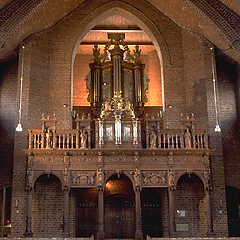The Culture of Pirate Music is characterised by a large group of people who broadcast and listen to music via the internet or at parties. It concerns the legal activities that originate from the illegal ether piracy.
The music consists largely of Dutch-language music, bands from the 60s, 70s and 80s, German hits and polkas. It is music that is hardly ever heard on regular radio stations.
Becoming a pirate has become much easier with the arrival of internet radio. Anyone with the appropriate equipment can decide to start broadcasting via the internet and thus become a pirate.
The larger legal internet stations are often groups of pirates that all take a part of the programming for their account in order to realise a full day programme. These pirates work from attics, sheds and log cabins in and around their homes. Their studios are often attractively decorated and during the broadcasts you can often hear that the studio is filled with visitors.
The listeners often send requests to the pirate, who discusses those in the broadcast with a talk show. The pirate addresses the listener very directly, for example by asking if the reception is good or asking for a greeting, a request, or a reaction. The contact between the artists and the fans is also very close. Many artists have direct contact with their fans and the internet stations. Artists who are enormously popular in the pirate world are often hardly known outside of it. Pirate music can be heard in almost every sports canteen, workplace and building site in the north and east of the Netherlands. This does not alter the fact that there are also pirate music lovers in other parts of the Netherlands.
Broadcasting is not the only thing that belongs to the Culture of Pirate Music. Pirate music can be heard at almost every village festival in the north and east of the Netherlands. Some festivals are annual, of which the Twente Pirate Feast in Rossum is the largest.



